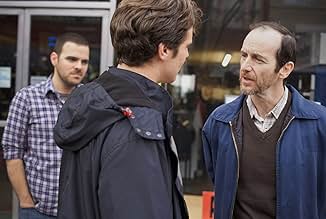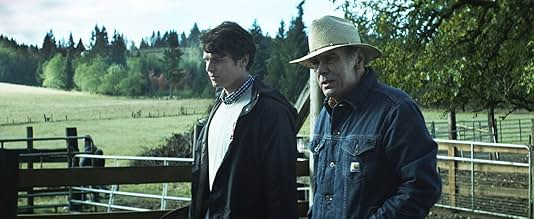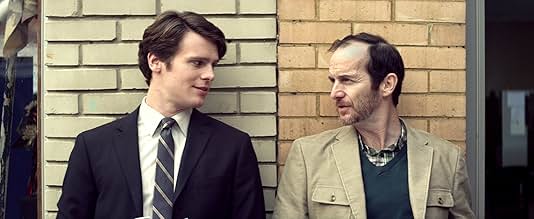VALUTAZIONE IMDb
5,6/10
3968
LA TUA VALUTAZIONE
Aggiungi una trama nella tua linguaA cocky young man travels to Oregon to work on an apple farm. Out of his element, he finds his lifestyle and notions being picked apart by everyone who crosses his path.A cocky young man travels to Oregon to work on an apple farm. Out of his element, he finds his lifestyle and notions being picked apart by everyone who crosses his path.A cocky young man travels to Oregon to work on an apple farm. Out of his element, he finds his lifestyle and notions being picked apart by everyone who crosses his path.
- Regia
- Sceneggiatura
- Star
- Premi
- 1 vittoria e 2 candidature totali
Zach Sanchez-Vitale
- Military Guy
- (as Zach Sanchez)
Eloy Méndez
- Pedro
- (as Eloy Mendez)
Cami Storm
- Pretty Mexican Girl
- (as Cami Marie)
Recensioni in evidenza
I knew very little about this film when I went into it except that it was inspired in some way by a David Sedaris essay. It surpassed my expectations in a beautiful and lasting way. It's extraordinarily funny - often in surprising ways. Like Sedaris' writing, things just happen, and it's the protagonist's reactions that allow the audience to enter this world of poignant meaninglessness. The characters and situations can be so absurd at times that you wonder what kind of world this is, how realistic or how exaggerated or how cinematic - but then you realize that life can really be like that... Groff does a stellar job playing with an open-minded and humorous pretentiousness. But what I thought was most impressive was Kyle Patrick Alvarez's subtly-brilliant treatment of both sexuality and religion, both of which are such matter-of-fact gray areas in the film that they leave the viewer wondering without ever asking him to. Great film - definitely catch it when it comes out.
C.O.G. is my favorite David Sedaris essay, even before I moved to Oregon and recognized some of its landmarks. The movie even begins with one of my favorite speeches from the essay, although the speech is much better on the page.
The story concerns a young man who fantasizes about joining the working class (as in Grapes of Wrath) and travels to Oregon to pick apples, work in an apple sorting factory, and make jade sculptures with a temperamental man who is trying to convert him to Christianity. In the essay, Sedaris, as himself, is state school educated, a stoner, accustomed to menial jobs, and from a working class family. In the movie, David – or Samuel, as he's calling himself – is a smarmy preppy educated at Yale who is first depicted reading Darwin's Origin of Species. When Sedaris makes fun of crazy people on a Greyhound, or working class people at a factory, it is clear that he is making fun of his own expectations, as well as people not far below him in social class. This is quite a contrast to an upper class character looking down on dumb poor people. This is one of the movie's first flaws. And it colors almost everything. What is his true motivation, if he is so jaded and cynical? What is the movie trying to tell us about working people and Christians when it presents us with this character as its hero?
A second flaw is one chief among Hollywood movies, even those intended for the art-house crowd. Though David Sedaris himself, as well as the lead actor, are openly gay, this movie wouldn't want to come out and just say such a thing, why people might flee into the streets. So it teases us with making us believe he might have a female love interest; it does not tell us what the source of the conflict is with his family (it would appear to be his coming out); it doesn't tell us why he is so freaked out by a co-worker's gay advances (is it because he's grossed out by the man or the concept?), or how any of this might impact his potential conversion to Christianity. I'm sure the director has a lofty, annoying explanation for this oversight, but I can count two "so, was he gay?" posts already on the list of five that show up on the main page.
The score, mainly percussion, will be off-putting to many, especially in the first scenes on the bus. And the ending will also confuse. After personal conflicts with many of the characters, how will his opinions and his Christian conversion change? We know IRL that David Sedaris went on to a happy life as a bestselling author. A less vague ending could have shown what the character learned from these experiences, especially since this movie tried so hard to be more sincere than its comedic base.
This movie has some things going for it, but it is philosophically a disappointment.
The story concerns a young man who fantasizes about joining the working class (as in Grapes of Wrath) and travels to Oregon to pick apples, work in an apple sorting factory, and make jade sculptures with a temperamental man who is trying to convert him to Christianity. In the essay, Sedaris, as himself, is state school educated, a stoner, accustomed to menial jobs, and from a working class family. In the movie, David – or Samuel, as he's calling himself – is a smarmy preppy educated at Yale who is first depicted reading Darwin's Origin of Species. When Sedaris makes fun of crazy people on a Greyhound, or working class people at a factory, it is clear that he is making fun of his own expectations, as well as people not far below him in social class. This is quite a contrast to an upper class character looking down on dumb poor people. This is one of the movie's first flaws. And it colors almost everything. What is his true motivation, if he is so jaded and cynical? What is the movie trying to tell us about working people and Christians when it presents us with this character as its hero?
A second flaw is one chief among Hollywood movies, even those intended for the art-house crowd. Though David Sedaris himself, as well as the lead actor, are openly gay, this movie wouldn't want to come out and just say such a thing, why people might flee into the streets. So it teases us with making us believe he might have a female love interest; it does not tell us what the source of the conflict is with his family (it would appear to be his coming out); it doesn't tell us why he is so freaked out by a co-worker's gay advances (is it because he's grossed out by the man or the concept?), or how any of this might impact his potential conversion to Christianity. I'm sure the director has a lofty, annoying explanation for this oversight, but I can count two "so, was he gay?" posts already on the list of five that show up on the main page.
The score, mainly percussion, will be off-putting to many, especially in the first scenes on the bus. And the ending will also confuse. After personal conflicts with many of the characters, how will his opinions and his Christian conversion change? We know IRL that David Sedaris went on to a happy life as a bestselling author. A less vague ending could have shown what the character learned from these experiences, especially since this movie tried so hard to be more sincere than its comedic base.
This movie has some things going for it, but it is philosophically a disappointment.
The instant I saw the boy from Glee on the screen with his college sweater, against a score of staccato claps, I knew this film and the word 'Pretentious' were already entwined till the credits with the muted plucking music.
So as the Backlash B-tch I am, I decided to watch the whole film just to spite that particular stereotype.
God, I'm glad I did! I was born in a religious cult...called C.O.G. So it's kind of unsurprising that I resonated with it. But this film has so much that is human, and raw, and true about it that it has to have some impact on the rest of you. Groff's performance goes from cocky and superior in the most honest portrayal of the usual American postgrad I've seen, to so vulnerable and naive and yearning that my heart felt like it was being crushed. He's as lost, disenfranchised and confused as every other 20-something I know - but it seeps out of his pores and swims in his eyes in a way that's very hard to watch. I guess that's the Millenial Generation, stripped bare and made fun of, yet not looked down on. David is just a boy, not a polarising symbol of a Lost Generation, and the film knows this.
Just a boy. That's why it hurt to see him be taken advantage of, time and again. It hurt even more, for me, to watch him try to find himself and cure his sexual 'sickness' in religion. I have known people like John. They exist. Everyone in this film exists.
I'm not being coherent. This film impacted me that much.
I think you should watch it.
So as the Backlash B-tch I am, I decided to watch the whole film just to spite that particular stereotype.
God, I'm glad I did! I was born in a religious cult...called C.O.G. So it's kind of unsurprising that I resonated with it. But this film has so much that is human, and raw, and true about it that it has to have some impact on the rest of you. Groff's performance goes from cocky and superior in the most honest portrayal of the usual American postgrad I've seen, to so vulnerable and naive and yearning that my heart felt like it was being crushed. He's as lost, disenfranchised and confused as every other 20-something I know - but it seeps out of his pores and swims in his eyes in a way that's very hard to watch. I guess that's the Millenial Generation, stripped bare and made fun of, yet not looked down on. David is just a boy, not a polarising symbol of a Lost Generation, and the film knows this.
Just a boy. That's why it hurt to see him be taken advantage of, time and again. It hurt even more, for me, to watch him try to find himself and cure his sexual 'sickness' in religion. I have known people like John. They exist. Everyone in this film exists.
I'm not being coherent. This film impacted me that much.
I think you should watch it.
The movie seems very promising in trailers and even when one starts watching it, almost until the end... when loose ends are left hanging and all of one's hopes for the movie's potential to communicate relevant and illuminating ideas collapse.
Moreover, their referring to many problematic notions and expressions remains unchecked. The use of "retard," "faggot" and "slut" is never explained or condemned. The idea of homosexuality as a sickness--is left unchecked, too; and so are the presentations of immigrant workers as thieves and of menial workers as stupid and not at the level of a college graduate. We are never told or shown how we are supposed to feel about any of these issues. And while the ambiguity of religion is largely okay in a world of various religious convictions (or lack thereof), I don't see how the rest of the topics can responsibly be treated as a matter of contention.
Yet, I loved Jonathan Groff's acting. I also loved the post-graduate attitude, which signified the place from which the emotional journey of the character began. I can really relate to it, too: the way your own struggles and successes make you feel superior to others. Which is why I was hoping David would learn to appreciate people and see them as his equals--which he partly, arguably, maybe did. But then, what was the point of religion? Why the ambiguity surrounding his sexuality? Did he have a problem with his sexual orientation?
I am just confused by the way the movie ended.
Although Jonathan Groff was brilliant, and C.O.G. was mostly well-written and filmed, I felt that it was cut short. Only 10 concluding minutes could clear a lot of my concerns, if included. But, as it stands, the movie is aesthetically, narratively, philosophically and socio-politically unresolved.
Moreover, their referring to many problematic notions and expressions remains unchecked. The use of "retard," "faggot" and "slut" is never explained or condemned. The idea of homosexuality as a sickness--is left unchecked, too; and so are the presentations of immigrant workers as thieves and of menial workers as stupid and not at the level of a college graduate. We are never told or shown how we are supposed to feel about any of these issues. And while the ambiguity of religion is largely okay in a world of various religious convictions (or lack thereof), I don't see how the rest of the topics can responsibly be treated as a matter of contention.
Yet, I loved Jonathan Groff's acting. I also loved the post-graduate attitude, which signified the place from which the emotional journey of the character began. I can really relate to it, too: the way your own struggles and successes make you feel superior to others. Which is why I was hoping David would learn to appreciate people and see them as his equals--which he partly, arguably, maybe did. But then, what was the point of religion? Why the ambiguity surrounding his sexuality? Did he have a problem with his sexual orientation?
I am just confused by the way the movie ended.
Although Jonathan Groff was brilliant, and C.O.G. was mostly well-written and filmed, I felt that it was cut short. Only 10 concluding minutes could clear a lot of my concerns, if included. But, as it stands, the movie is aesthetically, narratively, philosophically and socio-politically unresolved.
Just saw this with a friend and ended up in the lobby of the theater discussing it with 3 other people for about 30 minutes afterward. People we'd never met.
We all agreed the film is ambiguous in every way. Uncomfortably so. The film is about a young man who is green. One is reminded of Ben from The Graduate. He appears to be a lost soul with no anchor. He reaches out to people for assistance but appears to be only mildly interested in them or what their lives are about. He tends to adopt whatever interests they have in order to remain in their employ or care. He is completely unprepared for the people he meets in his journey to find himself.
The acting is excellent by everyone. For that I give this film a high rating. I'm not sure everyone will enjoy the film but there is no denying the talent here. Just be prepared that not every character in this film is happy and full of joy. It isn't a joyful experience.
We all agreed the film is ambiguous in every way. Uncomfortably so. The film is about a young man who is green. One is reminded of Ben from The Graduate. He appears to be a lost soul with no anchor. He reaches out to people for assistance but appears to be only mildly interested in them or what their lives are about. He tends to adopt whatever interests they have in order to remain in their employ or care. He is completely unprepared for the people he meets in his journey to find himself.
The acting is excellent by everyone. For that I give this film a high rating. I'm not sure everyone will enjoy the film but there is no denying the talent here. Just be prepared that not every character in this film is happy and full of joy. It isn't a joyful experience.
Lo sapevi?
- QuizThe first time one of David Sedaris' works has been adapted for the screen.
- Colonne sonoreEl Gusto
Written by Edward M. Smith
Performed by Eduardo Padilla
Courtesy of Black Toast Music
I più visti
Accedi per valutare e creare un elenco di titoli salvati per ottenere consigli personalizzati
- How long is C.O.G.?Powered by Alexa
Dettagli
- Data di uscita
- Paese di origine
- Siti ufficiali
- Lingue
- Celebre anche come
- Welcome to Oregon
- Luoghi delle riprese
- Aziende produttrici
- Vedi altri crediti dell’azienda su IMDbPro
Botteghino
- Lordo Stati Uniti e Canada
- 55.301 USD
- Fine settimana di apertura Stati Uniti e Canada
- 32.677 USD
- 22 set 2013
- Lordo in tutto il mondo
- 55.301 USD
- Tempo di esecuzione
- 1h 28min(88 min)
- Colore
- Proporzioni
- 2.35 : 1
Contribuisci a questa pagina
Suggerisci una modifica o aggiungi i contenuti mancanti






























